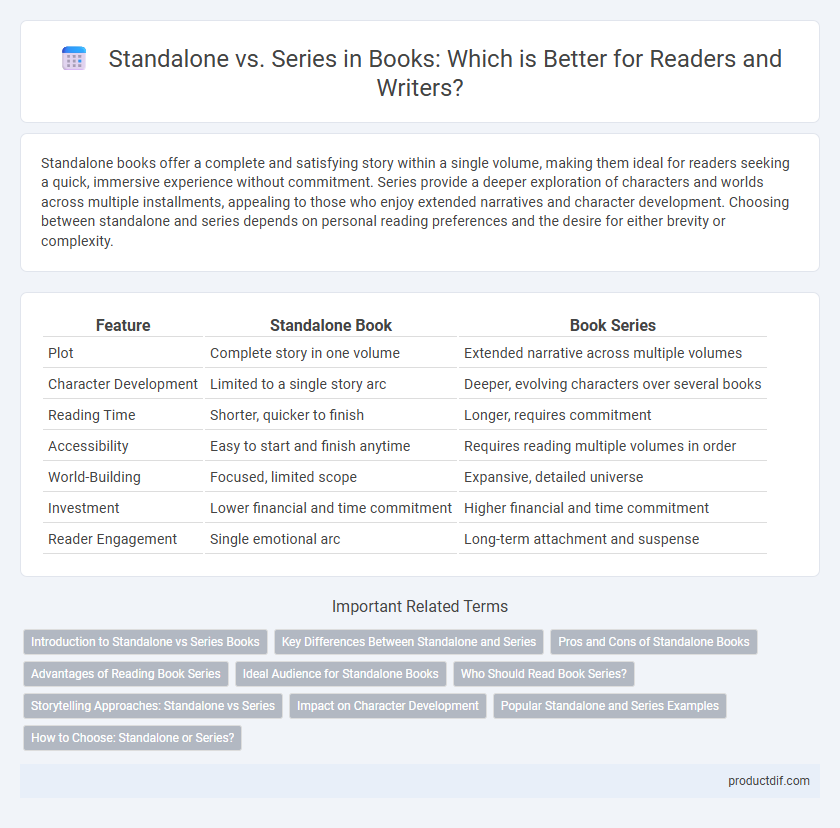Standalone books offer a complete and satisfying story within a single volume, making them ideal for readers seeking a quick, immersive experience without commitment. Series provide a deeper exploration of characters and worlds across multiple installments, appealing to those who enjoy extended narratives and character development. Choosing between standalone and series depends on personal reading preferences and the desire for either brevity or complexity.
Table of Comparison
| Feature | Standalone Book | Book Series |
|---|---|---|
| Plot | Complete story in one volume | Extended narrative across multiple volumes |
| Character Development | Limited to a single story arc | Deeper, evolving characters over several books |
| Reading Time | Shorter, quicker to finish | Longer, requires commitment |
| Accessibility | Easy to start and finish anytime | Requires reading multiple volumes in order |
| World-Building | Focused, limited scope | Expansive, detailed universe |
| Investment | Lower financial and time commitment | Higher financial and time commitment |
| Reader Engagement | Single emotional arc | Long-term attachment and suspense |
Introduction to Standalone vs Series Books
Standalone books provide a complete narrative within a single volume, offering readers a self-contained story without the need for continuation. Series books consist of multiple interconnected volumes, developing characters and plotlines over time to create an extended reading experience. Understanding the differences between standalone and series books helps readers choose based on their preference for closure or ongoing storytelling.
Key Differences Between Standalone and Series
Standalone books offer a complete narrative within a single volume, providing immediate resolution and self-contained story arcs. Series extend the storyline across multiple books, allowing for deeper character development, intricate plots, and evolving themes over time. Readers often choose standalones for quick, satisfying reads, while series appeal to those seeking prolonged engagement and complex world-building.
Pros and Cons of Standalone Books
Standalone books offer readers a complete narrative within a single volume, providing immediate satisfaction without requiring a commitment to multiple installments. They allow authors to experiment with diverse themes and styles without being constrained by extended plotlines or character development across several books. However, standalone novels may have less opportunity to build a loyal, long-term fan base compared to series, which often benefit from sustained reader engagement and deeper world-building.
Advantages of Reading Book Series
Book series provide readers with deeper character development and more intricate world-building, enhancing overall engagement and emotional investment. Extended narratives allow authors to explore complex plotlines and themes, offering richer storytelling experiences compared to standalone books. Readers benefit from consistent tone and familiar settings, making it easier to immerse themselves and maintain interest over multiple installments.
Ideal Audience for Standalone Books
Standalone books appeal to readers seeking a complete, immersive experience without commitment to multiple volumes, making them ideal for casual readers and those with limited reading time. These books often attract individuals who prefer a concise narrative arc, allowing for immediate satisfaction and closure. Standalone novels also cater to new readers exploring genres or authors, as they provide a self-contained story without requiring prior knowledge or investment in a series.
Who Should Read Book Series?
Book series are ideal for readers who enjoy immersive storytelling with complex characters and evolving plots that develop over multiple volumes, offering a richer narrative experience. Fans of genres such as fantasy, science fiction, or mystery often prefer series to fully explore detailed world-building and interconnected story arcs. Readers seeking ongoing engagement, character growth, and a deeper emotional connection will benefit most from committing to a book series rather than standalone novels.
Storytelling Approaches: Standalone vs Series
Standalone books deliver a complete narrative within a single volume, offering readers a quick, satisfying resolution and a focused storytelling arc. Series, on the other hand, allow for expansive world-building and character development across multiple installments, creating opportunities for deeper emotional investment and complex plot evolution. The storytelling approach in series enables authors to explore themes and subplots more thoroughly, while standalones emphasize concise and impactful storytelling.
Impact on Character Development
Standalone books offer complete character arcs within a single narrative, allowing for intense but concise development. Series provide extended timeframes for characters to evolve gradually, showing more complex growth and deeper psychological layers. Readers often experience stronger emotional connections with characters in series due to sustained exposure and multiple plot-driven transformations.
Popular Standalone and Series Examples
Popular standalone books like "To Kill a Mockingbird" by Harper Lee and "The Great Gatsby" by F. Scott Fitzgerald captivate readers with complete narratives in a single volume. In contrast, successful series such as J.K. Rowling's "Harry Potter" and George R.R. Martin's "A Song of Ice and Fire" offer expansive worlds and character development across multiple installments. Standalone novels provide concise literary experiences, while series foster deep engagement through prolonged storytelling arcs.
How to Choose: Standalone or Series?
Choosing between a standalone book and a series depends on reader preferences for depth and commitment. Standalone books offer a complete narrative in one volume, ideal for readers seeking closure without investing in multiple installments. Series provide extended character development and world-building, appealing to those who enjoy immersive, ongoing stories.
Standalone vs Series Infographic

 productdif.com
productdif.com